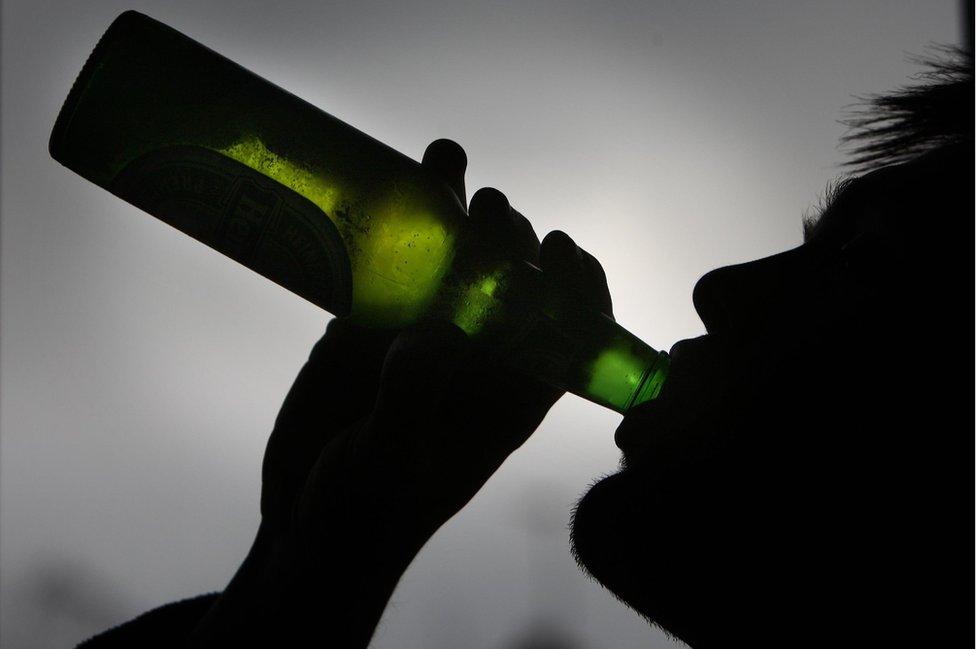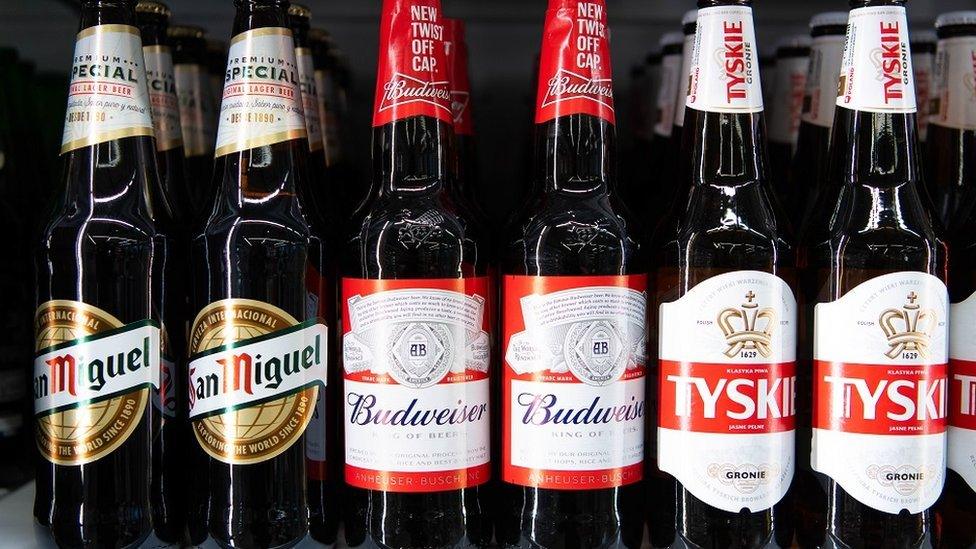Poorest Scots five times more likely to die of alcohol abuse
- Published

Alcohol-related deaths in Scotland are five times more likely amongst the most deprived groups, a report has found.
Public Health Scotland (PHS) statistics, external evaluated alcohol consumption, price, harms and inequalities.
It found "stark inequalities" between the poorest and most affluent adults who consume alcohol in terms of hospital stays and death statistics.
The figures come despite the Scottish government's introduction of a minimum unit price (MUP) in May 2018.
It requires all licensed premises in the country to set a floor price of 50p per unit of alcohol.
The Monitoring and Evaluating Scotland's Alcohol Strategy (MESAS) report 2022 found rates of alcohol-specific deaths were five times higher in Scotland's poorest communities.
And alcohol-related hospital stays were nearly eight times higher among the most deprived Scots.
Minimum unit pricing was introduced to curb excessive alcohol consumption and related harms, including death, crime and unemployment.
But a separate PHS report published earlier this month found "no clear evidence" the policy had reduced consumption amongst the most harmful drinkers.
Instead, it found those most dependent on alcohol would find alternative ways around the price hike - such as switching to alternative cheaper alcohol or spending less money on food and bills.
In 2020, 1,190 people died in Scotland due a cause wholly attributable to alcohol - an average of almost 23 people per week, official PHS data noted.

And death rates increased between 2019 and 2020 - an increase largely driven by deaths among males aged 45 and over.
Some 21,480 people in Scotland were admitted to a general acute hospital with an alcohol-related diagnosis in 2020/21, the data showed.
Vicki Ponce Hardy, public health intelligence adviser at PHS, said the report showed that significant inequalities were resulting in "preventable" deaths.
She added: "The most recent survey data shows that almost a quarter (24%) of adults in Scotland still drink more than the recommended, low risk, weekly, drinking guideline.
"Among those exceeding the guideline, it's those in the lowest income group who are likely to consume the most."
In 2021, the average price of alcohol sold in the off-trade in Scotland was 64p per unit, an increase from 63p in the previous year.
'Drug of choice'
The report also highlighted that 24% of adults in Scotland in 2019 reported exceeding the low-risk, weekly drinking guideline of 14 units, a decline from 34% in 2003.
Of those exceeding the guidelines, the average weekly consumption was highest mong those in the lowest income groups, the report showed.
Alcohol Focus Scotland described alcohol as the country's "drug of choice" and called for further investment in support and treatment services.
Chief executive Alison Douglas said: "With the recent rise in deaths from alcohol, reducing how much we drink must remain a priority.
"To ensure we are getting the most out of minimum unit pricing the Scottish government must optimise the price, bringing it at least in line with inflation.
"Alongside this we need restrictions on the aggressive marketing of alcohol and to reduce how easily available it is in our communities."
Scottish Conservative health spokesman Dr Sandesh Gulhane said the report showed MUP "isn't working" as alcohol-related deaths are at their highest level in Scotland since 2008.
He added: "SNP ministers are currently using a blunt instrument to tackle a very complex problem.
"We need a system that ensures everyone in Scotland is able to get treatment for addiction, recover and lead healthy lives - that is what the Scottish Conservatives' Right to Recovery Bill would deliver."
'We know there is more to do'
Public Health Minister Maree Todd welcomed the fact alcohol consumption last year remained at a similar level to 2020, which was the lowest level since 1994.
She added: "The downward trends in alcohol consumption are encouraging, however, at a population level, we are still drinking almost 30% more than the low risk, drinking guidelines of 14 units per adult per week.
"We know there is more to do. Work on reviewing the level of MUP is under way and we will be consulting on potential restrictions on alcohol advertising later this year."
Ms Todd said work s also ongoing with the UK government to develop new clinical guidelines for alcohol treatment.
It will aim to introduce new approaches to treatment and will apply to settings including primary care, hospital and justice.